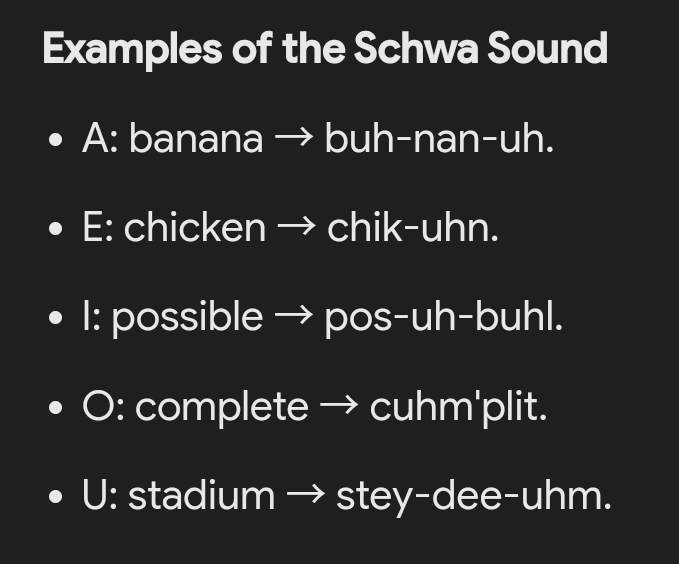w(uh)man to w(ih)men
Except by your own pronunciation guide:
w(uh)man to w(ih)men
Yeah that’s the spelling part OP is referring to
But the pronunciation changes there too*, contrary to what OP says.
* Maybe there are regional pronunciation differences I’ve never heard of before?
nah i say wuh-man and wih-min
It must only be in some places because where I live in the UK both parts change pronunciation.
Does in Midwest USA too.
Where’s that?
In UK it goes from
Woman – Wu mun
Women - Wi men
it’s normal for unstressed short vowels in English to all come out as a “schwa”, which the most common phoneme of the language.
https://en.m.wikipedia.org/wiki/Mid_central_vowel

What kind of weirdo says chick-uhn?
English speakers globally
I don’t pronunce any of those words like that. Maybe stadium I pronounce the same. Maybe.
Wait until you try to figure out how to pronounce “ough”, like in rough or through or dough.
Looks like it’s time to recommend one of my favorite books:
I found it via an interview with the author on the 99% Invisible podcast:
Corpse, Corps, Horse and Worse
It’s a great book because it lays out, very logically, all the ways our language went to shit. It was a product of the Great Vowel Shift and crappy timing regarding it, plus competing cultures ruling the lands in England.
Corpse, Corps, Horse, and Worse
I will keep you, Susy, busy,
Make your head with heat grow dizzy;
Tear in eye, your dress you’ll tear;
Queer, fair seer, hear my prayer.
Isn’t it just pronounced how it looks?
That’s a darn good shower thought.
English phonetics suck more than any other language ever spoke or tried to learn
That’s cuz English is a bully that beats up all the other languages and steals their words
Nah fam… the leader took the lead, then he lead while wearing lead. This is pure English, no loanwords.
Yes, English can be weird. It can be understood through tough thorough thought, though.

I remember a discussion on reddit saying there was a US dialect (perhaps PNW?) that changed the pronunciation of the -man/-men part of the word rather than the o, but I couldn’t get many further details at the time.
Anyone heard anything about this?
As someone who learned English as a second language. Yes, that pronunciation exists, I’ve heard it used on films. I don’t know if it is a formally defined or linguistically studied thing. But I can hear the different ways the exact same word is vocalized wildly different by different native English speakers. And they always claim theirs is the only correct way of saying it, even though they still somehow understood what was said.
North Atlantic accent I think it’s called. Have a read of the wiki. Kinda interesting.
I know when I pronounce it, it’s different on the a/e - NZ English.
We do also tend to change the o at the same time, at least I do. Although I spent 10 years in the uk in my 20’s so that has had some effect on how I speak.
Depends on how fast I’m talking but, yup. South islanders do it more than north ime.
Native Portlander here, that’s definitely not us. Wuh-man and Wim-min.
Best I can tell from quick internet searches: Old English: wīfmann/menn (“female person/s”). The w rounded the following vowel giving a wo- pronunciation, which for some reason (umlaut?) stuck for the singular but not the plural. The spelling of the plural changed to match that of the singular in spite of the pronunciation.
* Everything here carries the caveat “in some dialects, …” because English
How come it’s Germans and not Germen
How come it’s humans, not humen
It’s strangely kind of either/or for the pronunciation if you take a look at the IPA pronunciation of the words.
I wonder, though, if this lack of difference in pronunciation is behind a question that’s confounded me for years: “why do so many people spell the singular as ‘women’ by accident (e.g. ‘a women’), but I’ve never seen something like ‘a men’)?” I always chalked it up to “a men” looking weird as basically “amen”, but this could be it instead.
Op, you just aren’t saying them correctly, I guess.














